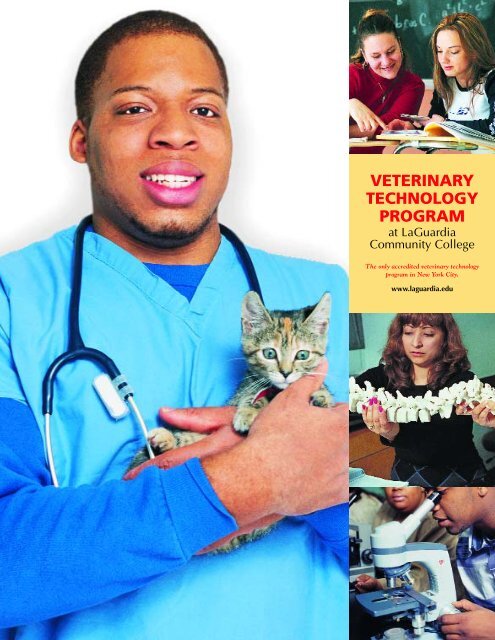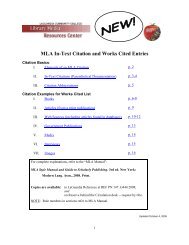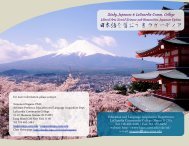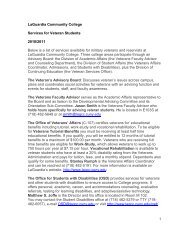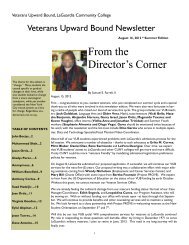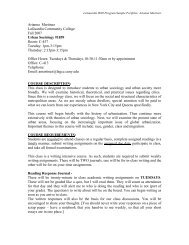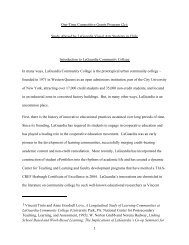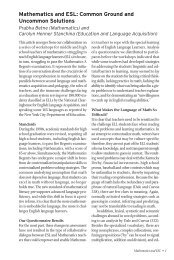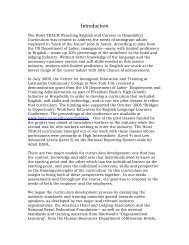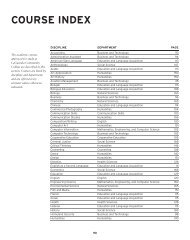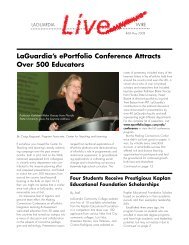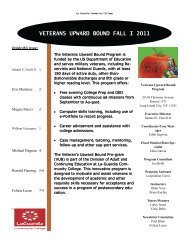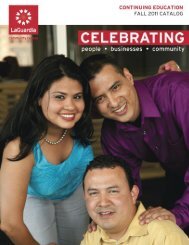Veterinary Technology Program - LaGuardia Community College
Veterinary Technology Program - LaGuardia Community College
Veterinary Technology Program - LaGuardia Community College
Create successful ePaper yourself
Turn your PDF publications into a flip-book with our unique Google optimized e-Paper software.
VETERINARY<br />
TECHNOLOGY<br />
PROGRAM<br />
at <strong>LaGuardia</strong><br />
<strong>Community</strong> <strong>College</strong><br />
The only accredited veterinary technology<br />
program in New York City.<br />
www.laguardia.edu
The <strong>LaGuardia</strong> Vet Tech <strong>Program</strong><br />
Combine your love and compassion for animals with a<br />
fascinating career through our <strong>Veterinary</strong> <strong>Technology</strong> <strong>Program</strong>.<br />
Seize your opportunity to become a <strong>Veterinary</strong> Technician in<br />
great demand by private veterinary practices, animals shelters,<br />
zoos, medical research laboratories, and private industry.<br />
The only fully accredited <strong>Veterinary</strong> <strong>Technology</strong> <strong>Program</strong> in<br />
New York City, <strong>LaGuardia</strong> offers an exciting learning<br />
experience in small, “hands-on” teaching situations which<br />
expose students to all areas of veterinary care. The program<br />
engages its students in a challenging academic experience<br />
that creates a fine balance between classroom instruction and<br />
practical work with animals.<br />
Top faculty teach a diverse curriculum exploring such areas<br />
as exotic animal medicine, transgenics and shelter medicine.<br />
The program maintains full accreditation by the American<br />
<strong>Veterinary</strong> Medical Association. Graduates are eligible to sit<br />
for the <strong>Veterinary</strong> Technician National Examination (VTNE)<br />
for New York State licensing.<br />
Upon graduation, <strong>LaGuardia</strong> students receive multiple job<br />
offers in top private and public animal care facilities throughout<br />
the country. In New York alone, <strong>LaGuardia</strong> graduates<br />
can be found caring for animals at such notable sites as<br />
Memorial Sloan Kettering, Columbia Presbyterian, the Animal<br />
Medical Center, and the city’s three major zoological parks—<br />
Bronx, Central Park, and Coney Island Aquarium.<br />
Unique Features of the <strong>LaGuardia</strong> Vet Tech <strong>Program</strong><br />
<strong>Program</strong> Entrance Requirements<br />
All new students are initially admitted into the “pre-clinical”<br />
phase of the <strong>Veterinary</strong> <strong>Technology</strong> program. Students may then<br />
file for candidacy consideration into the Clinical phase at the<br />
beginning of each Fall semester.<br />
Entrance to the Clinical phase of the program is competitive<br />
due to limited capacity. Candidates must have completed the<br />
12-credit “pre-clinical” course requirement (including<br />
specific introductory courses) by December, with a minimum<br />
2.50 GPA and successful completion of all <strong>College</strong> ACT<br />
entrance examinations. (See page 5 for the <strong>Veterinary</strong> <strong>Technology</strong> curriculum.)<br />
Candidates are then ranked on a scoring system based on overall<br />
GPA and grades in key courses. Meeting the minimum 2.50<br />
GPA is not a guarantee that a student will be selected for the<br />
Clinical phase.<br />
Notification of acceptance into the Clinical Phase of the<br />
<strong>Veterinary</strong> <strong>Technology</strong> <strong>Program</strong> occurs in late January. Clinical<br />
Phase courses for students accepted into the <strong>Program</strong> begin<br />
in the Spring Semester.<br />
Specific, minimum health requirements for students in the<br />
Clinical Phase of the program, including tetanus and other<br />
immunizations, are also in effect for the coming academic year.<br />
Please consult the <strong>Veterinary</strong> <strong>Technology</strong> <strong>Program</strong> Student<br />
Handbook for more information.<br />
What Employers and Graduates Say about<br />
<strong>LaGuardia</strong>’s Vet Tech <strong>Program</strong><br />
●<br />
●<br />
●<br />
●<br />
As part of their training and required class work,<br />
students assume responsibility for animal care,<br />
working with dogs, cats, rabbits, and mice in the<br />
college’s state-of-the-art <strong>Veterinary</strong> <strong>Technology</strong><br />
facility.<br />
Students learn to induce and monitor animals<br />
under anesthesia, insert intravenous catheters<br />
and administer medications.<br />
Students in the clinical phase of the program<br />
participate in two 10-week internships at one of<br />
many animal care facilities in the metropolitan<br />
area.<br />
Students also receive hands-on experience in<br />
farm animal nursing by completing a farm animal<br />
nursing class at the end of their 2nd year. This<br />
includes an intensive week-long work experience<br />
at Suffolk County Farm where students work with<br />
sheep, lamb, ducks, horses, llamas, pigs, and<br />
chickens. They also assist with births, neutering,<br />
and all aspects of farm animal husbandry.<br />
“Students get a real sense of what<br />
it’s like to work in a veterinary<br />
hospital. They not only gain essential<br />
hands-on training in animal medicine,<br />
but learn other tasks connected<br />
with the overall care of the animals,<br />
from cleaning their living quarters<br />
to keeping careful records of<br />
drugs being administered for any<br />
health problem.”<br />
Kathleen Pitriola, 2001 graduate<br />
Now at the<br />
Humane Society of New York<br />
“In the 10 years I’ve worked with <strong>LaGuardia</strong> vet tech interns, I’ve seen<br />
them apply the skills they learned at the college to become dedicated<br />
technicians in both private practice and research. The <strong>LaGuardia</strong> program<br />
allows them to have a caring and rewarding career, while enjoying<br />
their love for animals.”<br />
Dr. Keith Manning, Veterinarian<br />
East Side Animal Hospital, New York City<br />
3
Frequently Asked Questions<br />
What does a veterinary technician do?<br />
In general, the veterinary technician does many of the same tasks for the<br />
veterinarian that nurses and other professionals perform for physicians.<br />
These tasks include: general animal care; surgical assistance; medical<br />
treatments; laboratory tests, x-rays; anesthesia; radiology; and nursing<br />
and critical care.<br />
Does every facility give you the opportunity to perform<br />
all these tasks?<br />
The work of the veterinary technician varies with the type of practice.<br />
In a small animal practice, the technician will usually be involved in<br />
all aspects of the practice. In larger practices and in institutions,<br />
the technician may become specialized in some area of care such as<br />
surgery or intensive care.<br />
What if you wanted to work with animals other than<br />
dogs and cats?<br />
Graduates of the <strong>Veterinary</strong> <strong>Technology</strong> <strong>Program</strong> also work as laboratory<br />
animal technicians and zoo technicians in many research institutions<br />
as well as zoological parks and aquariums in the metropolitan area.<br />
They care for a wide variety of species, including carnivores, primates,<br />
birds, rodents, and others.<br />
Why would I need a license to work in an animal hospital?<br />
In New York State, only persons taking a state licensing exam and<br />
graduating from an accredited veterinary technology program may call<br />
themselves veterinary technicians. Just like nurses, students are<br />
required to study and educate themselves about how to complete<br />
veterinary medical tasks and procedures. This standard should not be<br />
lowered because the patient is an animal.<br />
Why would someone want to become a veterinary technician?<br />
Why wouldn’t they just become a veterinarian?<br />
The veterinarian decides what procedures or plans need to be completed<br />
to make an animal healthy again, but it’s the veterinary technician who<br />
orchestrates how and when to get the tasks accomplished quickly and<br />
with minimal stress to the animal. Graduates of <strong>LaGuardia</strong>’s <strong>Veterinary</strong><br />
<strong>Technology</strong> <strong>Program</strong> may apply to veterinary school by completing<br />
additional courses required by each respective school. <strong>LaGuardia</strong> students<br />
receive a two year associate degree.<br />
How much can I expect to be paid?<br />
<strong>Veterinary</strong> technicians start at rates averaging between $12 and $20 per<br />
hour. Once you have experience or acquire specialized training, pay is<br />
usually considerably higher.<br />
How Our Tuition Compares<br />
(as of Spring 2004)<br />
Other veterinarian technology programs in New York State cost upwards<br />
of $12,000/year. Here’s a breakdown of <strong>LaGuardia</strong>’s tuition:<br />
NY State Residents<br />
Non-NY State Residents<br />
Full-time $2800/year $5700/year*<br />
* Assuming 30 credits/year ($190/credit)<br />
4
Associate Degree in Applied Science<br />
Earn an Associate in Applied Sciences degree from <strong>LaGuardia</strong>’s<br />
<strong>Veterinary</strong> <strong>Technology</strong> <strong>Program</strong>. Develop and perfect your skills in:<br />
●<br />
●<br />
●<br />
●<br />
●<br />
●<br />
Surgical Preparation and Assistance<br />
Anesthesiology<br />
Medical Treatments<br />
Laboratory Techniques<br />
Radiography<br />
Farm Animals<br />
Take courses in:<br />
COUNSELING<br />
New Student Seminar0 credits<br />
ENGLISH: 6 credits<br />
Composition I ENG101** 3 credits<br />
Writing Through Literature ENG102 3 credits<br />
HUMANITIES: 3 credits (Select one the following courses:)<br />
Oral Communication HUC101 3 credits<br />
Speech: Voice and Diction HUC104 3 credits<br />
Communication in a Professional Setting HUC108 3 credits<br />
Communication and the Non-Native Speaker HUL100 3 credits<br />
MATHEMATICS: 3 or 4 credits (Select one the following courses:)<br />
Mathematics and the Modern World MAT107* 3 credits<br />
Elementary Statistics I<br />
MAT120* 3 credits<br />
Precalculus MAT200* 3 credits<br />
SOCIAL SCIENCE: 3 credits (Select one the following courses:)<br />
Introduction to Anthropology SSA100 3 credits<br />
Cultural Anthropology SSA101 3 credits<br />
Introductory Economics I SSE101 3 credits<br />
Themes in American History to 1865 SSH102 3 credits<br />
U.S. Power and Politics SSP101 3 credits<br />
Introduction to Sociology SSS100 3 credits<br />
General Psychology SSY101 3 credits<br />
NATURAL AND APPLIED SCIENCES: 12 credits<br />
Vertebrate Anatomy and Physiology I SCB208 2 credits<br />
Vertebrate Anatomy and Physiology II SCB209 3 credits<br />
Biological Chemistry SCC140** 3 credits<br />
General Microbiology SCB260 4 credits<br />
VETERINARYTECHNOLOGY: 24 credits<br />
Introduction to <strong>Veterinary</strong> <strong>Technology</strong> SCN101** 3 credits<br />
Research Animal <strong>Technology</strong> SCV201 4 credits<br />
<strong>Veterinary</strong> Nursing I SCV210 4 credits<br />
<strong>Veterinary</strong> Nursing II SCV211 4 credits<br />
<strong>Veterinary</strong> Radiography SCV212 3 credits<br />
<strong>Veterinary</strong> Laboratory Techniques SCV213 3 credits<br />
Farm Animal Nursing SCV214 3 credits<br />
Exotic Animal Nursing (elective) SCV220 2 credits<br />
Introduction to Animal Control (elective) SCV150 2 credits<br />
Transgenic Techniques (elective) SCV245 3 credits<br />
COOPERATIVE EDUCATION: 6 credits<br />
Gateway to the Workplace CEP100 1 credits<br />
Part-Time Internship (Research Animal Practice) CEP151 2 credits<br />
Full-Time Internship (Small Animal Practice) CEP201 3 credits<br />
UNRESTRICTED ELECTIVES: 2 or 3 credits<br />
2-3 credits<br />
* Students taking MAT 107 or MAT120 must take three credits of unrestricted electives.<br />
Students taking MAT 200 must take two credits of unrestricted electives.<br />
**Pre-clinical <strong>Veterinary</strong> <strong>Technology</strong> key course.<br />
Note:The <strong>Veterinary</strong> <strong>Technology</strong> courses required for this program are offered in the day.<br />
Successful completion of all ACT entrance examinations is required for acceptance into the Vet Tech Clinical<br />
Phase. Students enrolled in the <strong>College</strong> Preparatory Initiative (CPI) may be required to take more than 60 credits<br />
in order to graduate. Additional information regarding CPI may be found in the <strong>LaGuardia</strong> course catalog.<br />
5
Some Facts About <strong>LaGuardia</strong><br />
<strong>LaGuardia</strong> <strong>Community</strong> <strong>College</strong> has been named one of the Top<br />
Three large community colleges in the country according to a<br />
national student survey. (The <strong>Community</strong> <strong>College</strong> Survey for Student Engagement, 2003)<br />
Location<br />
Western Queens. 10 minutes via subway from Times Square and<br />
just minutes from Brooklyn. Queens is the most rapidly growing<br />
and ethnically diverse borough of New York City, which makes<br />
it the ideal place to learn about business, science & technology,<br />
health & human services and the arts.<br />
Academics<br />
31 degree programs, two one-year certificate programs, an<br />
intensive Internship <strong>Program</strong> and a rapidly growing Honors<br />
<strong>Program</strong> that features New York City’s only five-star chapter of<br />
the Phi Theta Kappa International Honor Society. As The<br />
New York Times said in November 2003, “<strong>LaGuardia</strong> <strong>College</strong><br />
Gets Its Due in a City of Academic Heavy Hitters.”<br />
Students<br />
Known as “The World’s <strong>Community</strong> <strong>College</strong>,” <strong>LaGuardia</strong> is a<br />
multicultural beacon for higher education, with an annual<br />
enrollment of 13,000 students from the United States and 150<br />
other countries. Most students hold part-time or full-time jobs<br />
during at least part of their matriculated studies.<br />
Faculty<br />
Of our 232 full-time professors, more than 45 percent have<br />
Ph.D.s—that’s more than twice the average for community college<br />
faculties nationwide. <strong>LaGuardia</strong> received the highest<br />
level of re-accreditation for the Middle States Commission on<br />
Higher Education for June 2002 through April 2012.<br />
Internships<br />
More than 4,000 students are placed in internship positions annually<br />
with one of over 600 companies and organizations.<br />
Internships allow students to explore exciting career options in a<br />
wide range of fields through dynamic educational experiences<br />
in the business capital of the world.<br />
Campus<br />
The campus consists of four buildings covering over 1.5 million<br />
square feet. This includes over 100,000 square feet of laboratories,<br />
a 750-seat theater, a six-lane NCAA regulation-size<br />
swimming pool, a modern fitness center, a sports gymnasium,<br />
a tennis court and the Archives of New York Mayors <strong>LaGuardia</strong>,<br />
Wagner, Beame, Koch and the New York City Council.<br />
Library<br />
The <strong>LaGuardia</strong> library is staffed with friendly and welcoming<br />
professionals familiar with the curricula being taught in the<br />
classrooms and who can work with students one-on-one and<br />
in groups. Because <strong>LaGuardia</strong> students lead busy lives, our<br />
librarians focus on ways to help them utilize their study time,<br />
6
which includes learning how to make best use of the internet<br />
and other resources and references for their research. Your<br />
<strong>LaGuardia</strong> student ID gives you access to, and book borrowing<br />
rights at, all 19 CUNY campus libraries.<br />
Tuition<br />
As part of the City University of New York, <strong>LaGuardia</strong> has the<br />
lowest college tuition in New York City.<br />
Leadership Training<br />
<strong>LaGuardia</strong> provides opportunities for students to learn and<br />
hone leadership skills via annual conferences, workshops and<br />
seminars. Time management training, effective leadership styles,<br />
event planning and public speaking techniques are just some<br />
of the workshops given throughout the year. These events are<br />
open to all students.<br />
Exchange <strong>Program</strong>s<br />
<strong>LaGuardia</strong> has student exchange and transfer programs with<br />
Barnard <strong>College</strong>, Columbia University, Vassar <strong>College</strong>, and<br />
additional colleges in 30 countries around the world.<br />
Student Life<br />
<strong>College</strong> isn’t just about classrooms, books, and libraries. It’s<br />
about growth and self-discovery, too. <strong>LaGuardia</strong> has more than<br />
25 student clubs, an active Student Government and Student<br />
Activities Council that can serve as a catalyst for change in<br />
your life. We encourage you to explore these on-campus organizations<br />
and take advantage of networking opportunities with<br />
other students—it’s the best way to maximize the richness of<br />
your college experience.<br />
Entrance Requirements<br />
A High School Diploma or G.E.D. is required. The S.A.T. is<br />
not necessary for admission, but a satisfactory score can exempt<br />
a student from certain placement tests (which are given after<br />
admission into the college).<br />
International Students<br />
As a thriving college, <strong>LaGuardia</strong> attracts students from around<br />
the world. Our International Students Services Office is a<br />
comprehensive, informative resource for current and prospective<br />
students from every culture, providing them with information<br />
that helps them to set and meet their educational goals.<br />
Free Tutoring Labs<br />
<strong>LaGuardia</strong>’s numerous programs and resources include small<br />
group academic help. Whether you prefer working with a professor<br />
or fellow student, you have many options to choose from.<br />
On-Campus Childcare<br />
<strong>LaGuardia</strong> students lead very busy lives, but we have created<br />
the most supportive environment possible by providing a<br />
high-quality, on-campus childcare center and a pre-K through<br />
2nd Grade school where your children can be nearby at all<br />
times while receiving a top-notch education themselves.<br />
7
VETERINARY TECHNOLOGY<br />
PROGRAM<br />
at <strong>LaGuardia</strong> <strong>Community</strong> <strong>College</strong><br />
The City University of New York<br />
Office of Admissions<br />
31-10 Thomson Avenue, M-147<br />
Long Island City, NY 11101<br />
Western Queens<br />
10 Minutes from Times Square<br />
www.laguardia.edu<br />
718 482-5000<br />
callcenter@lagcc.cuny.edu<br />
<strong>Program</strong>s of Study<br />
Accounting<br />
Accounting & Computers<br />
Administrative Assistant<br />
Business Administration<br />
Business Management<br />
Child Development<br />
Computer Operations<br />
Computer Sciences<br />
Computer <strong>Technology</strong><br />
Deaf Studies<br />
Dietetic Technician<br />
Education Associate: Bilingual Child<br />
Education (Childhood Education)*<br />
Education (Secondary Education)*<br />
Emergency Medical <strong>Technology</strong>/Paramedic<br />
Fine Arts<br />
Foodservice Management<br />
Gerontology<br />
Human Services<br />
Humanities<br />
International Studies<br />
Labor and <strong>Community</strong> Organizing<br />
Liberal Arts<br />
Mathematics and Science<br />
Media Studies<br />
Mental Health<br />
Mortuary Science**<br />
New Media <strong>Technology</strong><br />
Nursing<br />
Occupational Therapy Assistant<br />
Paralegal Studies<br />
Photography<br />
Physical Therapist Assistant<br />
Social Sciences and Humanities<br />
Travel and Tourism<br />
Theatre and Communication<br />
<strong>Veterinary</strong> <strong>Technology</strong><br />
Plus 1-Year Certificate <strong>Program</strong>s in<br />
Commercial Photography and<br />
Word Processing Specialist.<br />
*Joint Associate/Bachelor’s Degree program.<br />
**Joint Associate Degree program with<br />
American Academy/McAllister Institute.<br />
How to Get to Our Campus<br />
By Subway:<br />
Via No. 7 Train: Get off at 33rd Street station. Walk two<br />
blocks westbound to Thomson Avenue and Van Dam Street.<br />
Via E, V & R Trains: Get off at Queens Plaza Station and<br />
exit the station at the Jackson Avenue and Queens<br />
Boulevard exit. Walk across the Queens Boulevard Bridge<br />
(over the Sunnyside train yards) until you reach the<br />
corner of Van Dam Street and Thomson Avenue.<br />
Via G Train: Get off at Court Square Station (at the<br />
Citicorp Building in Long Island City). Walk across the<br />
Thomson Avenue Bridge.<br />
Via N & W Trains: At Queensboro Plaza station transfer to<br />
the No. 7 train (local to Main Street) and get off at the<br />
33rd Street station. Walk two blocks westbound to<br />
Thomson Avenue and Van Dam Street.<br />
By Bus:<br />
From Queens: Take the Q60 or Q32 to Queens<br />
Boulevard and Skillman Avenue. Walk one block west to<br />
the corner of Van Dam Street and Thomson Avenue, or<br />
take the Q39 to Thomson Avenue and Van Dam Street.<br />
From Brooklyn: Take the B61 to the Citicorp Building in Long<br />
Island City. Walk across the Thomson Avenue Bridge.<br />
From Bronx: Take the QBx1 from Coop City to Main<br />
Street, Flushing or take the Q44 to Main Street Flushing.<br />
At Main Street, take the No. 7 subway to the 33rd Street<br />
Station, then walk two blocks westbound to Thomson<br />
Avenue and Van Dam Street.<br />
From Manhattan: Take the Q32 up Madison Avenue and<br />
across the 59th Street Bridge. Get off at the intersection of<br />
Queens Boulevard and Skillman Avenue and walk on<br />
block to the intersection of Thomson Avenue and Van<br />
Dam Street.<br />
<strong>LaGuardia</strong> <strong>Community</strong> <strong>College</strong> is an Equal Opportunity and Affirmative Action Institution. The <strong>College</strong> does not discriminate on the basis of race, color, national or ethnic origin, religion, age, sex, sexual orientation,<br />
transgender, disability, genetic predisposition or carrier status, alienage or citizenship, veteran or marital status in its student admissions, employment, access to programs, and administration of educational policies.


